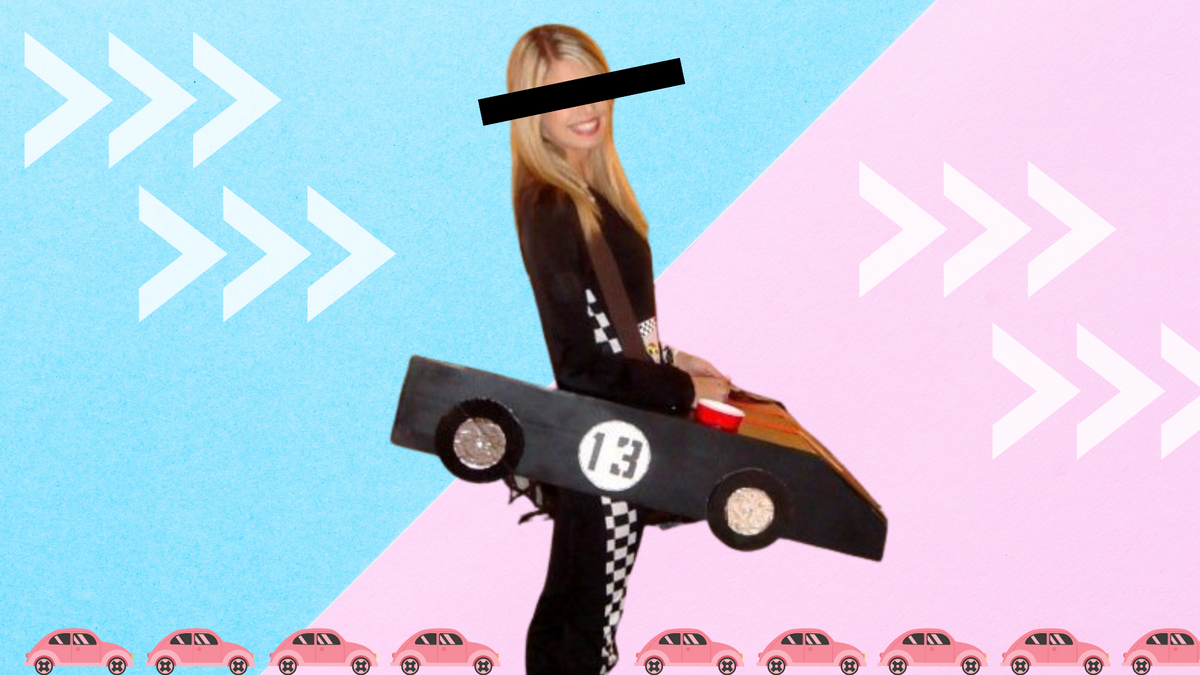My Niece Is a Car
She used to be a human being. We're not supposed to talk about that anymore.

My niece is a car. She used to be a human being. We're not supposed to talk about that anymore.
About a year ago, my sister Claire called and told me that she was tired of hand-sewing costumes for her oldest daughter, Alice. One day Alice would beg to be dressed as a school bus, the next a pickup truck, and the next, a sports car. She told her mom that she wished she were an automobile instead of a person. Claire was running out of material and patience.
At first, Alice's behavior made sense to me. She'd loved to play with toy cars when she was little, and she had a wonderful imagination. I'll admit that I was one of the family members who found her new hobby cute. Some thought it was just a phase and that we should humor her. Others tried to convince her that she couldn't actually become an automobile. And some tried to bolster her self-esteem by reminding her that cars are cool, but so are twelve-year-old human girls.
My doubts began when Alice asked that her body be covered with metal. What about gymnastics? Claire asked. You wouldn't be able to bend anymore. Alice started to cry. I don't want to bend, she said. I want to zoom.
Claire reluctantly bought scraps from the junkyard and glued them onto her daughter each morning. Alice couldn't walk as well when she had her panels on (as she called them), but she did seem to smile more. When Claire pulled off the panels before Alice's bath one night, some skin came with them, and she bled. Alice said that the pain was worth it and that she wanted permanent parts installed.
Soon after, Alice changed her name to Vroom. Her homeroom teacher stood with his arm around her shoulder while her classmates chanted support for her automotive identity. All 28 of them signed a pledge never to call her by her dead name again. I was shocked when I saw the footage posted on the school website under "Student Achievements."
Then came the fines. Vroom had checked out all the critical transportation theory books from the library. Pages began appearing magnetized to the fridge, with lines of text obliterated by black marker and angry notes in the margins. Claire found piles of ashes in the oven, wads of shredded paper in the trash can. Even when the library fines were deducted from Vroom's allowance, she would not stop.
Vroom demanded that everyone she knew identify as human, car, or hybrid. We all updated our email signatures. I ordered replacements for my expensive business cards. And when I phoned Vroom, I would say, "This is your human aunt." It seemed obvious that I was human, but accommodating her didn't hurt anyone, I rationalized, and I wanted to keep her happy.
After coming home from a meeting of her automotive club one evening, Vroom announced she would sleep in the garage from then on. When her parents said no, Vroom made engine-revving sounds and repeatedly crashed into the wall. Her father, Bob, began moving her bedroom furniture.
I drove the 50 miles to my sister's house after Vroom and the other kids were asleep. Claire and Bob and I sat around the kitchen table, staring into our coffee cups without drinking. Claire broke the silence with whispered questions: Why doesn't Vroom want to be a human being? Why can't she simply play with cars instead of trying to become one? What did we do wrong? When will this end?
I speculated that a preteen doesn't have a lot of control over her life. This car obsession could be a way to gain some power and force adults to accommodate her.
Claire said that before the whole thing started, she'd noticed Vroom struggling to fit in at school. She frequently found her standing in front of a mirror, scowling. Perhaps the shiny and successful Auto Influencers in Vroom's social media feeds made her think that becoming a car would resolve her insecurities. This sort of transition was becoming more common among Vroom's peer group. In a different generation, she might have listened to rock music or protested a war.
Claire's commentary was interrupted by the scraping sound of a chair thrust out from the table. "I'm going to bed" was the first and only thing Bob said that night.
A few months later, the school sent home a note declaring garages exclusionary and demanding that cars and people park within the same structures. It was implied that the state might impound Vroom if her parents didn't acquiesce. That weekend, a contractor dismantled the wall between the garage and the kitchen.
This victory seemed to embolden Vroom, and soon after, she had her first repair. Her stomach and intestines were replaced with a gas tank and her colon with an exhaust pipe. "Consent from guardians is not required," the mechanic told her horrified parents afterward. "How could a child be allowed to make a decision that will affect the rest of her life without your even telling us?" Claire asked. "None of this is reversible, is it?" The mechanic contacted the school board, who mandated therapy for both Vroom and her parents.
I and other family members attended one of the therapy sessions. Vroom sobbed as she confessed how violated she felt by those of us who still had a separate garage in our house. But what about our property values? I wondered. What if we don't want to inhale exhaust fumes? What about our rights? Our health? I asked the therapist these questions in private afterward. He said that if we didn't affirm Vroom's automotivity by destroying our oppressive human structures, she might intentionally total herself, and it would be our fault.
I am ashamed to say, I demolished my home and moved all my possessions into storage so Vroom would feel comfortable when she came to visit. We sat out on the barren lot together and listened to the radio she'd recently had installed. But I slipped and called her Alice while complimenting her audio equalization. That was the last time I was allowed to see her.
Claire still calls and tells me about each new repair. Vroom recently had her breasts replaced with headlights, but the procedure didn't go well, and the bulbs are dim. She can't merge safely on the highway because her gears are sluggish and, I'm told, probably always will be. Even though no one verbalizes it for fear of the repercussions, we all know she gets worse mileage than factory-manufactured cars.
I miss my niece. I fear that when she's a classic, Vroom may regret having had herself rebuilt, as many in her position do. Within certain circles, we refer to her as "the cartastrophe." But I don't have time to grieve for her now. There's a nascent tragedy I must try to prevent: my best friend's son just told her he wants to be a fireplace.
This article was originally published in American Thinker and is republished here with the permission of the author.
Enter your email below to sign in or become a 4W member and join the conversation.
(Already did this? Try refreshing the page!)




Comments